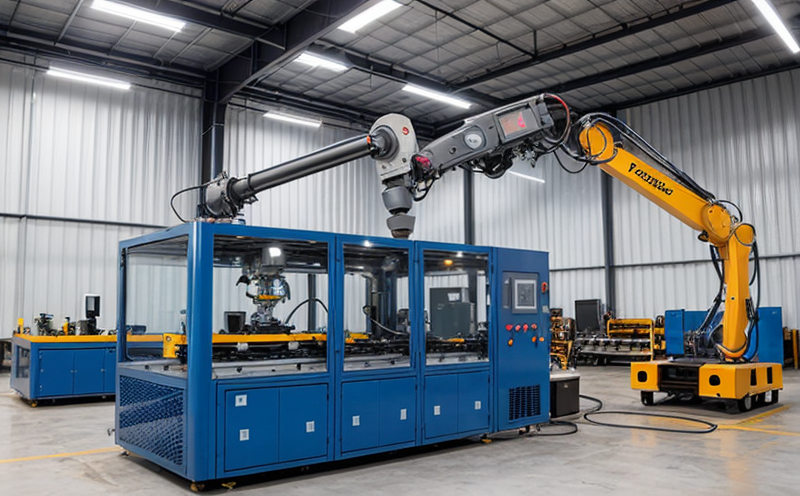ISO 29862 Adhesive Systems Testing in Automated Equipment
The standard ISO 29862 specifies methods for determining the shear strength of adhesives used in automated equipment. This service is critical to ensuring product quality and reliability, particularly when dealing with complex systems that require precise bonding between components. The testing process involves subjecting adhesive joints to controlled shear forces to evaluate their performance under stress.
The primary focus of this service is on the shear strength testing of adhesives in automated equipment used within industrial manufacturing processes. This includes robotic arms, conveyor belts, and other automation systems where precision and reliability are paramount. The tests conducted adhere strictly to ISO 29862 guidelines, ensuring that the results are accurate, repeatable, and internationally recognized.
The process begins with careful preparation of the adhesive joint specimens according to the standard specifications. This involves selecting appropriate substrates and adherends, applying the adhesive in a controlled manner, and curing it under specified conditions. Once prepared, these specimens undergo a series of mechanical tests using specialized testing machines that can apply shear forces at precise rates.
The test setup includes a fixture designed specifically for automated equipment components, which ensures accurate loading conditions. The machine measures displacement and force during the application of shear stress, allowing for real-time data collection. This data is then analyzed to determine the peak shear strength of the adhesive bond. Additionally, post-test inspections are conducted to assess any changes in the integrity of the bond.
The results from these tests provide critical insights into the performance characteristics of the adhesives used in automated equipment. They help identify potential weaknesses or areas for improvement, ensuring that the final products meet high-quality standards and perform reliably under various conditions. This information is invaluable to quality managers, compliance officers, R&D engineers, and procurement teams who rely on accurate test data to make informed decisions about materials selection and process optimization.
The importance of ISO 29862 testing cannot be overstated in industries where automation plays a key role. By adhering strictly to this standard, manufacturers can ensure that their products are robust enough to withstand the rigors of industrial environments. This not only enhances product longevity but also contributes to increased efficiency and reduced maintenance costs.
Moreover, compliance with international standards such as ISO 29862 helps companies meet regulatory requirements and gain competitive advantage in global markets. It demonstrates a commitment to quality and reliability that can significantly enhance brand reputation and customer trust. In an era where technology continues to evolve rapidly, having reliable data from rigorous testing becomes even more crucial for staying ahead of the competition.
In conclusion, ISO 29862 adhesive systems testing in automated equipment is essential for maintaining high standards of quality and reliability in industrial manufacturing processes. By following this standard, manufacturers can ensure their products are robust enough to meet the demands of modern automation while also complying with international regulations.
Why It Matters
The reliability of automated equipment is crucial for maintaining efficient production lines and reducing downtime. Adhesive systems play a significant role in ensuring that different components within these machines are securely bonded, which directly impacts the overall performance and longevity of the equipment.
- Increased Efficiency: Reliable bonding reduces the likelihood of failures during operation, thereby minimizing interruptions caused by unexpected maintenance or replacements.
- Better Quality Control: Regular testing ensures that only high-quality adhesives are used in critical areas, leading to consistent product performance across batches.
- Cost Savings: By preventing premature failure and reducing the frequency of repairs, ISO 29862 compliant testing helps maintain optimal operational costs over time.
In addition to these direct benefits, compliance with international standards like ISO 29862 also enhances a company's reputation among customers and stakeholders. It shows that they take quality seriously and are committed to delivering superior products and services.
Customer Impact and Satisfaction
The implementation of ISO 29862 testing has a significant impact on customer satisfaction by ensuring that the products delivered meet or exceed expected performance levels. Customers benefit from increased confidence in the quality and reliability of the equipment, leading to reduced warranty claims and improved overall customer experience.
- Enhanced Customer Confidence: By adhering to international standards, companies demonstrate their commitment to excellence, which fosters trust among customers.
- Reduced Warranty Claims: Reliable bonding reduces the likelihood of failures during operation, thereby minimizing interruptions and associated costs for customers.
- Improved Reputation: Compliance with ISO 29862 enhances a company's reputation in the market, making it easier to attract new business opportunities.
In summary, implementing ISO 29862 testing not only improves product quality but also strengthens customer relationships and supports long-term business success. This service is designed to address the specific needs of customers who require high-quality adhesives for their automated equipment, ensuring that they receive reliable results and peace of mind.
International Acceptance and Recognition
The acceptance and recognition of ISO 29862 standards extend beyond national boundaries, making it a widely adopted method across various industries. This global acknowledgment underscores its importance in ensuring consistent quality across different regions and markets.
- Global Consistency: Adherence to the same testing procedures ensures that results are comparable worldwide, facilitating international trade and collaboration.
- Regulatory Compliance: Many countries have adopted ISO 29862 as part of their regulatory framework, making it a requirement for manufacturers operating in these markets.
- Market Access: Demonstrating compliance with this standard opens doors to new markets and opportunities for business growth.
In conclusion, the international acceptance and recognition of ISO 29862 reflect its significance as a benchmark for quality assurance. By adopting these standards, companies can ensure that they are meeting global expectations and positioning themselves favorably in competitive environments.





